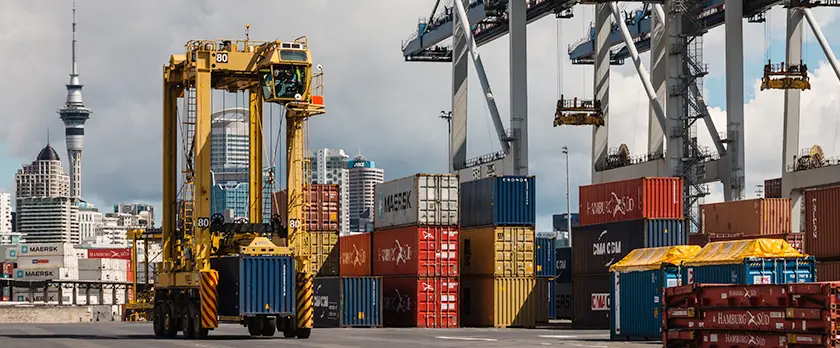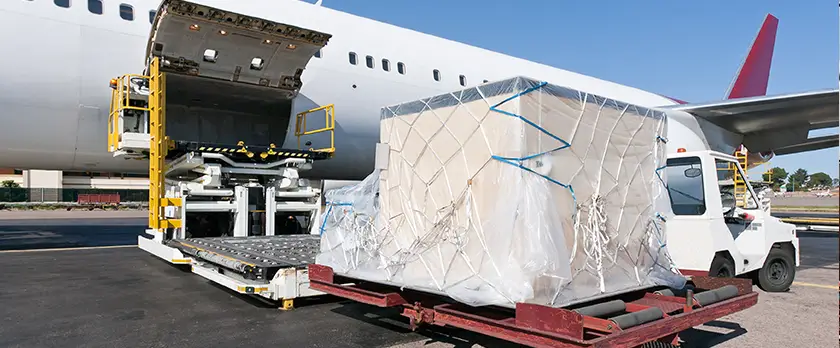UK ⇆ New Zealand Shipping Rates 2025
New-Zealand has several trade agreements that facilitate easier and more cost-effective trade. The UK and New Zealand have negotiated a free trade agreement (FTA) that aims to reduce tariffs and simplify trade procedures, benefiting importers. At DFS Worldwide we have established a robust network of trusted partners to work with, this network ensures efficient coordination, reliable service and competitive rates for your shipments from Auckland, Christchurch and Wellington.
Sea Freight

FCL - UK to New Zealand
| POD | 20ft | 40ft |
| Auckland | $3300 | $6095 |
| Wellington | $3300 | $6095 |
Based on POL London, pricing is indicative only and excludes all local charges, customs etc.
FCL - New Zealand to UK
| POL | 20ft | 40ft |
| Auckland | $4175 | $6545 |
| Wellington | $4175 | $6545 |
Based on POD London, pricing is indicative only and excludes all local charges, customs etc.
LCL - UK to New Zealand
| POD | OCF W/M |
THC W/M |
DOCS |
| Auckland | $157 | £13 | £25 |
| Christchurch | $176 | £13 | £25 |
| Wellington | $291 | £13 | £25 |
LCL – New Zealand to UK
| POL | OCF W/M |
THC W/M |
DOCS |
| Auckland | $175 | £37 | £28 |
| Christchurch | $205 | £37 | £28 |
| Wellington | $240 | £37 | £28 |
- Volumetric pricing, THC has a Minimum of 2 CBM.
- Collection charges are not included. Pricing is indicative only.
- Terms and conditions apply.
Welcome to our LCL services
At DFS Worldwide, we understand that not all shipments require a full container. That's why we offer comprehensive Less than Container Load (LCL) services to accommodate your smaller shipments with the same level of care and efficiency as our full container services.
What is LCL Shipping
LCL shipping is a cost-effective solution for businesses or individuals who don't have enough cargo to fill an entire container. With LCL, your goods share container space with other shipments headed to the same destination. This allows you to pay only for the space you need, making it an ideal option for smaller shipments.
Why Choose Our LCL Services?
1. We can offer door-to-door services from New Zealand to the UK using a range of reliable carriers.
2. Port to port rates can be obtained directly from the website for standard cargo meaning you have access to instant rates, alternatively you can speak to the sales team for the same competitive rates or anything outside of ‘standard’ cargo.
3. We offer regular, frequent sailings to Southampton ensuring your cargo is on a quick and efficient service.
4. We can arrange customs clearance on your behalf at the major seaports in the UK.
For Customers
Are you a small business owner looking to ship goods internationally? Or an individual relocating to a new country? Our LCL services are tailored to meet your unique shipping needs. With flexible scheduling options and personalized support, we make the shipping process hassle-free, allowing you to focus on what matters most – your business or your move.
For Freight Forwarding Partners
Looking for a reliable partner to handle your LCL shipments? Partner with us and gain access to our extensive network, cutting-edge technology, and dedicated support team. Whether you need assistance with consolidation, documentation, or transportation, we have the expertise and resources to streamline your LCL operations and help you deliver exceptional service to your clients.
Contact Us Today
Ready to experience the benefits of our LCL services? Get in touch with us today to learn more about our rates and how we can customize a shipping solution to meet your needs. Whether you're shipping a small package or a large cargo, we're here to help you navigate the complexities of international logistics with ease.
For door-to-door rates please contact us.
Air Freight

| Destination | 50 kg | 200 kg | 500 kg |
| Auckland (AKL) | £261 | £589 | £1230 |
| Christchurch (CHC) | £293 | £738 | £1610 |
| Wellington (WLG) | £333 | £862 | £1695 |
- Rates above exclude collection, screening, handling, export declaration, documentation. Please contact us for the latest air freight rates.
- AOL: London Heathrow
- Delivery of cargo can vary from 3 - 7 working days form door to airport
Exporting to New Zealand
1. New Zealand export overview
New Zealand has a population of over 4.6 million and a global ranking of 23 for Gross Domestic Product (GDP) per capita at current exchange rates. Its economy was worth about £140 billion in 2016.
For many years earnings were mainly from farm products, such as wool and dairy goods. Today these are combined with new developments like tourism, film production, and wine making.
New Zealand depends heavily on international trade, especially with Australia, China, the United States and Japan. Economic free-market reforms from the 1980s have removed many barriers to foreign investment.
Strong cultural ties with the UK have created a shared trust – a great platform to start doing business.
Benefits for UK businesses exporting to New Zealand include:
- similar legal and financial systems to the UK
- excellent test market for niche and high-value products and services
- English speaking
- low corruption levels
- stable political system
- ranks first of 189 economies for ease of doing business
Strengths of the New Zealand market include:
- geographic position allows for easy access to Pacific Island market
- opposite time zones allow for 24 hour working
- small but developed market
- strong intellectual property (IP) and regulatory systems
2. Challenges doing business in New Zealand
Doing business in New Zealand is very similar to doing business in the UK. If your product or service is successful in the UK, there’s a good chance you’ll be successful in New Zealand. At present there are no major challenges to UK companies.
3. Growth potential
3.1 Economic growthNew Zealand has a strong, stable economy that operates on free market principles and has close economic relations with Australia. GDP registered 3.6% growth in the June 2015 to 2016 period. This is one of the strongest growth rates in the developed world.
At October 2016, unemployment was at 4.9%.
Services are the biggest sector of the economy and account for two thirds of total GDP. The other contributors are:
- rental, hiring, and real estate services – 18%
- retail and wholesale trade – 18%
- professional, scientific, technical, administrative and support – 15%
New Zealand’s priority sectors for economic development include:
- infrastructure and housing affordability
- transport
- tourism
- digital economy
New Zealand has unilateral Free Trade Agreements (FTA) with:
- Australia
- China
- Hong-Kong
- Singapore
- Malaysia
- Thailand
- Taiwan
- South Korea
New Zealand is also a member of the Trans-Pacific Partnership Agreement.
4. UK and New Zealand trade
The UK is New Zealand’s fifth largest 2-way trading partner. It is the fifth largest market for total exports from New Zealand and the ninth largest source market. Imports of goods and services from the UK were worth over £1.1 billion in 2015.
New Zealand’s top 5 imports from the UK are:
- vehicles
- machinery and mechanical parts
- electrical machinery and goods
- print products, such as books
- pharmaceutical products
5. Opportunities for UK businesses in New Zealand
The UK’s reputation for making high-quality goods is important, where it can compete with lower priced goods sourced from other countries. New Zealand’s small open market also makes it a sound choice for UK small and medium enterprise (SME) companies new to exporting.
5.1 Construction and infrastructureThe construction sector is one of the largest sectors in New Zealand, generating around £17 billion of gross revenue per year.
The most significant opportunities for UK firms are around Auckland’s ambitious infrastructure plans (a rail loop, new waterfront, and multiple large-scale housing developments).
New Zealand has a capable but overstretched construction industry. There are opportunities for UK expertise for:
- designers
- consulting engineers
- building materials suppliers
Opportunities for UK companies include:
- housing and infrastructure projects in Auckland
- rail and road projects
Despite weakening commodity prices, agriculture dominates exports from New Zealand. New Zealand’s has a world-renowned reputation for producing high quality dairy and meat products.
The government wants to increase investment in R&D in this sector which will also involve the food technology sector.
There are opportunities for UK companies in:
- Research and Development (R&D)
- technology
- biotechnology
- genetics
- farm machinery
New Zealand has one of the best funded public health sectors in the world. The market has a turnover of approximately £7.9 billion.
New Zealand has a growing aged population which will result in increased demand for healthcare and medical devices.
Opportunities for UK companies include:
- medical devices
- educational resources
- safety devices
- health technology
Development of New Zealand’s ICT infrastructure in education continues to be a priority for the government. The sector is seeing a noticeable shift in procurement from physical to digital/online resources.
Teachers of religious studies and special needs report a lack of engaging resources.
Opportunities for UK companies include:
- engaging resources
- early childhood resources to support curriculum
6. Start-up considerations
New Zealand’s business-friendly taxation system supports:
- capital development
- research and development
- international investment
There are three commonly used business structures in New Zealand:
- sole trader
- partnership
- limited liability company (LLC)
You must register with the Companies Office. Overseas companies can operate in New Zealand as a subsidiary, branch or become a New Zealand company. It takes just one day to incorporate a business in New Zealand.
The New Zealand government’s business website contains information on starting, managing and growing your business.
7. Legal considerations
All legislation relating to the conduct of business and the operation of companies is enacted by New Zealand’s parliament and administered by government agencies. You can see all legislation on the Parliamentary Counsel Office website.
For advice on legal issues, the New Zealand Law Society provides details of local lawyers.
7.1 Standards and technical regulationsAll products sold in New Zealand must be safe. There are two key laws that deal with product safety:
- the Consumer Guarantees Act, which gives minimum standards of quality for goods and services
- the Fair Trading Act, which promotes product safety
Importers must ensure products meet the minimum standards for the products to be allowed to enter the country.
You can check the required standards at Standards New Zealand.
7.2 Intellectual property (IP)The Intellectual Property Office of New Zealand (IPONZ) is the government agency responsible for granting and registering intellectual property.
Copyright protection automatically applies in New Zealand from the date of creation. Patents and trademarks only provide protection within New Zealand.
8. Tax and custom considerations
8.1 Goods and services taxGoods and Services Tax (GST) is a tax on most goods and services in New Zealand. The current GST rate is 15%.
8.2 Company taxThe company tax rate is 28%. For more information visit Inland Revenue.
8.3 Individual income taxDifferent types of individual income can include:
- salary or wages
- pensions
- dividends
- rental income
- interest received
If you are not a New Zealand resident you will need to work out your tax residency status so you can find out your individual income tax rate.
8.4 CustomsAll goods imported into New Zealand for business or commercial purposes are liable for Customs duty, GST and other applicable fees. Indicative rates can be found in the Working Tariff Document of New Zealand. The Customs NZ website explains how the charges are calculated.

